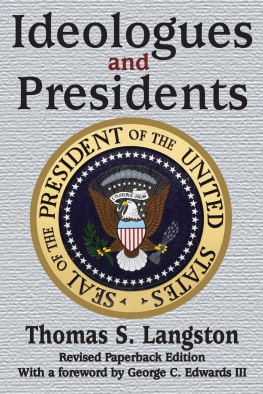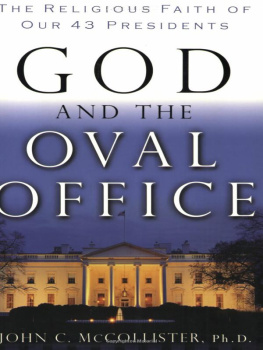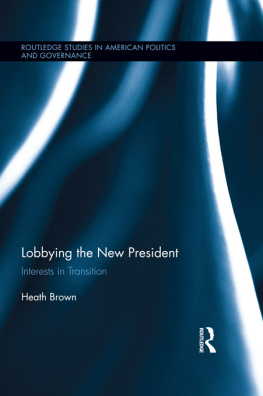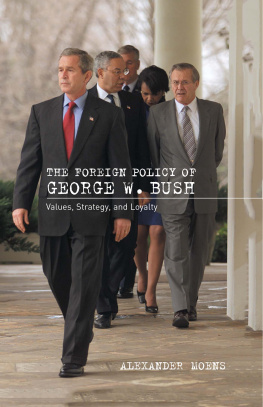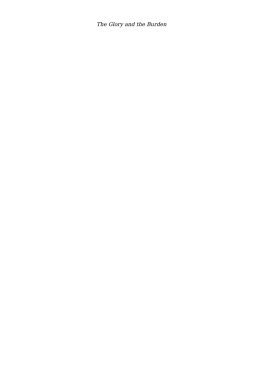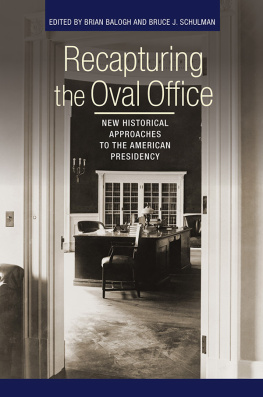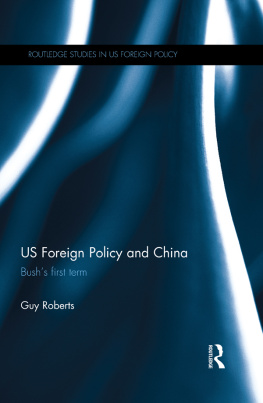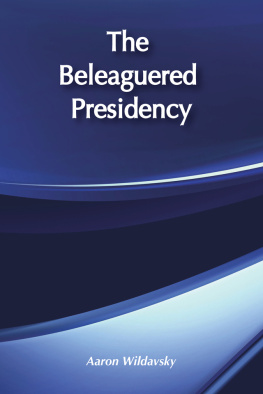
Ideologues
and
presidents
Ideologues
and
presidents
Revised paperback edition
Thomas S. Langston
With a foreword by George C. Edwards III
Originally published in 1992 by The Johns Hopkins University Press.
Published 2017 by Routledge 2 Park Square, Milton Park, Abingdon, Oxon OX14 4RN 711 Third Avenue, New York, NY 10017, USA
Routledge is an imprint of the Taylor & Francis Group, an informa business
New material this edition copyright 2014 by Taylor & Francis.
All rights reserved. No part of this book may be reprinted or reproduced or utilised in any form or by any electronic, mechanical, or other means, now known or hereafter invented, including photocopying and recording, or in any information storage or retrieval system, without permission in writing from the publishers.
Notice:
Product or corporate names may be trademarks or registered trademarks, and are used only for identification and explanation without intent to infringe.
Library of Congress Catalog Number: 2013035352
Library of Congress Cataloging-in-Publication Data
Langston, Thomas S.
Ideologues and presidents / Thomas S. Langston; With a new preface by the author. -- Revised paperback edition.
Published 2014 by Transaction Publishers
pages cm
Originally published in 1992 by The John Hopkins University Press. Includes bibliographical references and index.
ISBN 978-1-4128-5363-7
1. Presidents--United States--Case studies. 2. Ideology. 3. Roosevelt, Franklin D. (Franklin Delano), 1882-1945. 4. Johnson, Lyndon B. (Lyndon Baines), 1908-1973. 5. Reagan, Ronald. I. Title.
JK518.L35 2014
973.920922--dc23
2013035352
ISBN 13: 978-1-4128-5363-7 (pbk)
To Clegg Ivey and Mike Sherman
Outstanding Former Students, Even-Better Friends and Colleagues
Contents
Foreword
The challenges of governing have rarely been greater. The distance between the parties in Congress and between identifiers with the parties among the public is the greatest in a century. The public accords Congress the lowest approval ratings in modern history, but activists allow its members little leeway to compromise. The inability of Congress and the president to resolve critical problems results in constant crises in financing the government, endless debate over immigration, health care, environmental protection, and other crucial issues, and a failure to plan effectively for the future.
Differences in ideology stand at the center of this political polarization. It is common for scholars to study the level of ideology among the mass public, and they have found that many more Americans are able to choose an ideological label and use it to guide their political judgments than in previous decades. Ideological self-placements are influential determinants of vote choice, issue attitudes, and views toward government spending.
Less studied is the key question of how the ideas that define ideologies arise and become part of the political mainstream. Tom Langston, one of our most astute observers of presidents, provides an answer. He focuses on the role of people of ideas, ideologues. These idealistic and dedicated men and women have distinct ways of thinking about the world and fervently believe in their social and economic theories. Over time, ideologues have become more systematically integrated into White House operations and more closely involved in defining the policies of modern presidents.
Langston finds ideology influencing national politics in all the attempts at major policy redirections since the 1930s. The New Deal, the Great Society, and the Reagan Revolution all featured starry-eyed visionaries in competition with a host of more pragmatic actors. In this revised paperback edition, he broadens his attention to illustrate the outsized influence of foreign policy intellectual activists, some of whom he identifies as ideologues, in the George W. Bush administration. In the Obama administration, he shows how the interplay of ideological actors and the broader cultural background in American politics, which is still distinctly individualistic, has constrained ideological adventurers on the Left.
Along with his insights on individual presidents, Langston brings to life some of the ideologues who had significant influence on a presidents policies. There is Arthur Morgan of the original Tennessee Valley Authority (TVA) Board, who thought the TVAif administered to maximize cooperative planningcould bring about the next step in the evolution of mankind. There is the Great Society architect asserting in a task force meeting on the Model Cities program that in the future, living in a federal housing project would be a status symbol. And there is Jude Wanniski, the former Las Vegas reporter who became a true-believing supply-side salesman. In addition to the dreamers and schemers of ideologically-inspired adventures of the not-so-distant past, he discusses more familiar names from the recent past: the neoconservatives surrounding Dick Cheney, Donald Rumsfeld, and George W. Bush; and some lesser known (and far less successful) ideological champions in the Obama administration.
Langston makes two other important contributions. First, his original and rich analysis, drawing on archives, interviews, oral histories, government documents, and other primary sources, explains the increasing influence of ideologues. Party alliances and the temperament of individual presidents kept them in check until the 1980s. Beginning in the Reagan administration, however, there were fewer partisan obstacles to turning their dogma into public policy.
Equally important, Langston raises fundamental questions about the impact of ideologues. They are a destructive as well as a creative force in policy making. Dogmatic and zealous, they operate with tunnel vision and are prone to overreaching and concluding that the ends justify the means.
At a time when ideologues seem to be ascendant, this provocative volume could not be more timely.
George C. Edwards III
December 2013
Preface
No one wants to be an ideologue. That is perfectly understandable. What has never made sense to me, though, is the reluctance of so many people in my discipline of political science to acknowledge their existence. Political scientists have paid a great deal of attention to ideology, but have managed in the process virtually to ignore the people who make ideology and give it power through their actions, not just their thoughts. Treating ideology as a matter of connecting the dots within individual belief systems obscures the group dynamics at play, as well as the way that ideologies evolve over time.
Consider, for instance, how and who decides what position real conservatives should take on gay marriage or immigration. On these and a host of similar issues, different principles previously confirmed as conservative cut different ways. What is conservative, one might well ask, about empowering the federal government to erect an enormous fence along the border and to restrict the movement of eager laborers into the nations workforce? On the other hand, one might also ask what is conservative about failing to protect the nations sovereignty, as well as its traditional culture, from an influx of foreign people with foreign ways. The same is true for what makes for the liberal or progressive position on, for just two examples, the use of military force to stop brutal civil wars abroad, or what role, if any, nuclear power should play in the nations energy future. Logic does not decide such things; ideologues do, and by their choices channel the energies of their movements.

